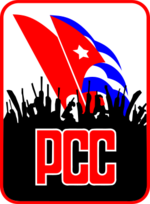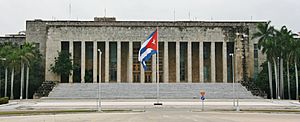Communist Party of Cuba facts for kids
Quick facts for kids
Communist Party of Cuba
Partido Comunista de Cuba
|
|
|---|---|
 |
|
| First Secretary | Miguel Díaz-Canel |
| Founder | Fidel Castro |
| Founded | 3 October 1965 |
| Preceded by | United Party of the Socialist Revolution of Cuba |
| Headquarters | Palacio de la Revolución, Plaza de la Revolución, Havana |
| Newspaper | Granma |
| Youth wing | Young Communist League |
| Children's wing | José Martí Pioneer Organization |
| Armed wing | Cuban Revolutionary Armed Forces |
| Membership (2022 est.) | |
| Ideology |
|
| Political position | Far-left |
| Regional affiliation | COPPPAL São Paulo Forum |
| International affiliation | IMCWP For the Freedom of Nations! |
| Colors | Red Blue |
| Slogan | ¡Hasta la victoria siempre! ("Ever onward to victory!") |
| National Assembly |
442 / 470
|
| Party flag | |
 |
|
The Communist Party of Cuba (PCC) is the main political party in Cuba. It was started on October 3, 1965. This party took over from an earlier group called the United Party of the Cuban Socialist Revolution. That group was formed after the 1959 Cuban Revolution.
The Communist Party of Cuba leads the country. The Cuban constitution says the party is the "leading force of society and of the state." The party follows ideas like Marxism–Leninism, which is a type of communism. It also supports ideas from Cuban leaders like Fidel Castro and Che Guevara.
The highest group in the party is the Party Congress, which meets every five years. When the Congress is not meeting, the Central Committee takes charge. Most daily tasks are handled by the Politburo. Since April 2021, Miguel Díaz-Canel has been the party's First Secretary. He has also been the President of Cuba since 2018.
Contents
History of the Party
How the Party Started
Cuba had different communist and socialist groups even before 1959. One of these was the Popular Socialist Party. After the 1959 Cuban Revolution, several groups joined together. In July 1961, the Integrated Revolutionary Organizations (ORI) was formed. This group included:
- Fidel Castro's 26th of July Movement
- The Popular Socialist Party
- Parts of the student-led Revolutionary Directory
On March 26, 1962, the ORI became the United Party of the Cuban Socialist Revolution. This party then officially became the Communist Party of Cuba on October 3, 1965. The Cuban constitution states that the Communist Party guides society and the government. It helps Cuba build a socialist society.
Party Growth and Leadership
For its first 15 years, the Communist Party was not very active outside of its top leaders. The Central Committee did not meet often. It took ten years for the first regular party Congress to be held. In 1969, the party had about 55,000 members. This made it the smallest ruling communist party in the world at that time.
In the 1970s, the party started to grow and become more organized. By 1975, it had over 200,000 members. The Central Committee began meeting regularly. This helped the party take on a stronger leadership role in Cuba. By 1980, membership grew to over 430,000, and by 1985, it reached 520,000. The party made sure its leaders were placed in important government jobs.
The Eighth Party Congress took place from April 16 to 19, 2021. At this meeting, Miguel Díaz-Canel was chosen as the First Secretary of the Central Committee. He took over from Raúl Castro.
How the Party is Organized
The Communist Party of Cuba leads Cuba as a one-party state. This means it is the only political party allowed to exist and govern. Other political groups are not allowed to form.
Party Congresses
The Communist Party of Cuba holds a big meeting called a Congress every five years. These usually happen in years ending in -6 and -1, like 2016 and 2021. Sometimes there are exceptions, like the long gap between the Fifth Congress and Sixth Congress (1997 to 2011).
Central Committee
The main leadership groups of the party used to be the Politburo and the Secretariat. In 1991, these two groups were combined into a larger Politburo. However, the Secretariat was brought back in 2002. There is also a Central Committee that meets between the party congresses. At the Fifth Congress, the Central Committee was made smaller, from 225 members to 150.
Fidel Castro was the party's First Secretary (leader) from the beginning. Raúl Castro was the Second Secretary. When Fidel Castro stepped down in 2008, Raúl Castro became the First Secretary.
Politburo
A group of 14 members for the Politburo was chosen on April 19, 2021. This happened after the 8th Party Congress.
Secretariat
A group of 6 members for the Secretariat was also chosen on April 19, 2021, after the 8th Party Congress.
Groups Connected to the Party
The Communist Party of Cuba works with many other organizations in Cuba. These groups help connect the party to different parts of society:
- Young Communist League: This is the youth group for future party members. It was started by Fidel Castro in 1962.
- Workers' Central Union of Cuba: This is a large union for workers in Cuba.
- Federation of Cuban Women: This group focuses on women's issues.
- National Association of Small Farmers: This organization supports farmers.
- José Martí Pioneer Organization: This is a student group for children.
- Student Federation of Secondary Education: This group is for high school students.
- University Student Federation: This group is for university students.
- Committees for the Defense of the Revolution: These are community groups that help with local projects.
- Association of Combatants of the Cuban Revolution: This group is for active and retired military members.
- Union of Journalists of Cuba: This is an organization for journalists.
Youth Groups
The Communist Party of Cuba has a youth group called the Young Communist League. It also has a children's group called the José Martí Pioneer Organization.
Party Ideas
The Communist Party of Cuba officially follows Marxism–Leninism. This is an idea that aims to create a communist society. Since the Cuban Revolution, the party has also followed ideas from Fidel Castro (called Castroism) and Che Guevara (called Guevarism). Castroism includes ideas from José Martí, a Cuban national hero.
Economy
The party has been careful about making big changes to Cuba's economy. However, it has had to accept some market-style changes. This happened especially after the Soviet Union broke up, which meant Cuba lost a lot of economic support.
When Raúl Castro became the leader, he worked to "renew" Cuba's socialist economy. He introduced new ways of trading and distributing goods that were more like market systems. This made some people wonder if Cuba might move towards an economy similar to China's or Vietnam's. In 2019, a new constitution was approved by the people. It recognized private property and the need for foreign investment.
Foreign Relations
The Communist Party of Cuba has often been involved in other countries' politics. It has helped left-wing revolutionary groups and governments in places like Colombia, El Salvador, Nicaragua, and Grenada. One of its most important international roles was in the Angolan Civil War, where Cuba helped lead a force with Angola and the Soviet Union. More recently, the party has supported left-leaning leaders in Latin America, such as Hugo Chávez in Venezuela and Evo Morales in Bolivia.
The party also uses "medical diplomacy." This means it sends thousands of Cuban doctors, agricultural experts, and other professionals to help people in developing countries around the world. The party also supports countries in Latin America working together.
Elections in Cuba
The Communist Party of Cuba is the only legal party in Cuba. This means that in elections for the National Assembly of People's Power, all candidates are supported by the party. The table below shows how many seats the party's candidates have won over the years.
| Election | Party leader | Seats | Result |
|---|---|---|---|
| 1976 | Fidel Castro |
489 / 489
|
Sole legal party |
| 1981 |
499 / 499
|
Sole legal party | |
| 1986 |
510 / 510
|
Sole legal party | |
| 1993 |
589 / 589
|
Sole legal party | |
| 1998 |
601 / 601
|
Sole legal party | |
| 2003 |
609 / 609
|
Sole legal party | |
| 2008 |
614 / 614
|
Sole legal party | |
| 2013 | Raúl Castro |
612 / 612
|
Sole legal party |
| 2018 |
605 / 605
|
Sole legal party | |
| 2023 | Miguel Díaz-Canel |
470 / 470
|
Sole legal party |
See also
 In Spanish: Partido Comunista de Cuba para niños
In Spanish: Partido Comunista de Cuba para niños
 | Dorothy Vaughan |
 | Charles Henry Turner |
 | Hildrus Poindexter |
 | Henry Cecil McBay |


